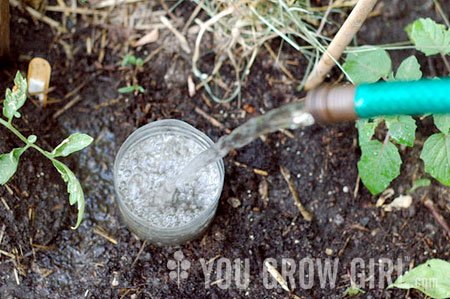
The last time I forgot to water my outdoor potted plants and discovered them completely wilted and hanging on the cusp of near death, I decided it was time to take action. Some of the plants on my deck receive a full, searing sun all day long during the hottest mid summer days. While these plants thrive under such conditions if properly taken care of, they will die quickly if they don’t receive enough water. Although it has been unusually rainy this year in these parts, full sun deck plants will still get extremely hot and dry very quickly.
One of the best ways to provide a steady water supply to your plants without your constant attention is the gradual watering system or drip irrigation. Through this method a device is employed that slowly delivers water into the soil directly around the roots. Commercial watering spikes can be purchased from you local garden centre however, using recycled materials you can make your own drip irrigation system for free.
The materials you will need are as follows:
- 2 litre plastic soda bottle or water bottle that still has the lid
- Drill and small drill bit
- Sharp knife
- Cutting surface
Drill 4-8 small holes into the cap of the plastic bottle. If you want it to drip slower use less holes, faster use more holes. Don’t make holes that are too small, they will become clogged up by debris. Remove the bottom of the bottle by cutting across with a sharp knife. I find a serrated knife works well. Removing the bottom of the bottle creates a funnel for you to easily pour water into. The wide mouthed opening will also catch some water when it rains.
Dig a hole next to a plant or in between a grouping of plants that is deep enough to bury at least one third to one half of the bottle. If you position the bottle in amongst a grouping of plants it will be hidden from view. Place the bottle in the hole with the cap side down and secure it into the hole by pressing dirt around it. This will ensure that your bottle stays in place. Pour water into the bottle until it is full. You can add fertilizer to the bottle every few weeks so that your plants are fertilized right at the roots.
You will need to fill your bottle when it is empty, once a day or less depending on how much direct, hot sun your plants receive. Make several bottles to place in all your large containers or next to plants in your garden such as tomatoes that require a lot of water.